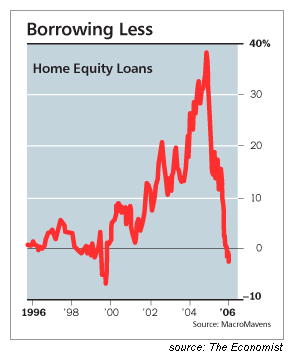

|
| weblog/wEssays | home | |
|
Our Era in a Word: Greediocy (February 9, 2006) My good pal and most excellent Ka'a'awa blogger Ian Lind coined a new word last week which justly describes our sad state of affairs: greediocy. To quote from Ian's February 1 entry: Greediocy: The foolish decisions made pursuing promises of easy riches.  What's so refreshing about Ian's new word is that it speaks to the disturbing and
ultimately destructive mindset at the foundation of the housing "boom"/bubble: build it
quick, build it cheap and flip it fast. While the developer/homeowner is anxiously
calculating their return on investment, or gloating over yet another 15% rise in real estate
values, the built environment--that is, all the buildings which have been tossed up in the
frenzy--will still be here long after the euphoria has faded. The community at large will
be stuck with the consequences, even as the over-leveraged developers and homeowners
are filing for bankruptcy and the lenders are nailing up "for sale" signs by the score and
ordering more by the truckload.
What's so refreshing about Ian's new word is that it speaks to the disturbing and
ultimately destructive mindset at the foundation of the housing "boom"/bubble: build it
quick, build it cheap and flip it fast. While the developer/homeowner is anxiously
calculating their return on investment, or gloating over yet another 15% rise in real estate
values, the built environment--that is, all the buildings which have been tossed up in the
frenzy--will still be here long after the euphoria has faded. The community at large will
be stuck with the consequences, even as the over-leveraged developers and homeowners
are filing for bankruptcy and the lenders are nailing up "for sale" signs by the score and
ordering more by the truckload.
Think it can't happen? It appears it's already happening: The Star-Telegram newspaper (Texas) reports that "Home foreclosures continue to climb. The number of homes slated for foreclosure continues to rise in Tarrant County, with 1,101 headed to auction next month. That is a 17-year high, according to Foreclosure Listing Service. That total is up 27.6 percent from a year ago."You may think such visions are absurd, but I recommend you read a bit of history before you reject the possibility of severe declines in real estate. The last era in which borrowing, debt and greediocy rose to such heights was the late 1920s, a period of excessive speculation and debt which led to the Great Depression. At the height of the Depression (which was plumbed not in 1929, but years later in 1936-7), a glorious New York highrise was sold for the cost of its elevators. Yes, a $5 million building constructed in the late 1920s was sold for $100,000 at the bottom. Now that's what we call depreciation. To quote Jackson Brown: "Don't think it won't happen just because it hasn't happened yet." * * * copyright © 2006 Charles Hugh Smith. All rights reserved in all media. I would be honored if you linked this wEssay to your site, or printed a copy for your own use. * * * |
||
| weblog/wEssays | home |